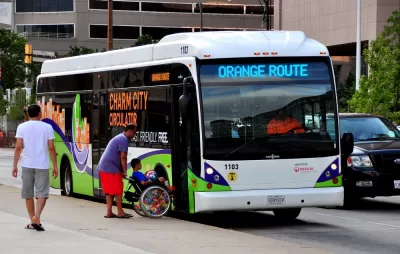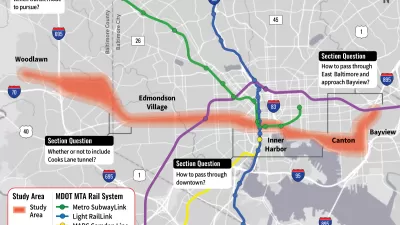The impact of the coronavirus on capital budgets has been feared for the duration of the pandemic, and the catastrophic reality of those fears is now apparent in a proposed capital budget for transportation in the state of Maryland.

"The Maryland Department of Transportation on Tuesday released a draft of its capital budget for the next six years, and it includes major cuts across MDOT due to the coronavirus, including at the Maryland Transit Administration," reports David Collins.
"The fiscal year budgets from 2021 to 2026 includes a $2.9 billion reduction compared to the previous six years. About two-thirds of that -- $1.9 billion -- is directly related to the coronavirus pandemic," explains Collins.
Among the various agencies and programs impacted by the cuts, the budget cuts $150 million in funding for the Maryland Transit Administration, which has responded by proposing service cuts.
In a separate article following the new about the Maryland Department of Transportation's new budget, Alex Holt digs into the details of the expected service cuts, especially for the city of Baltimore, where the cuts are expected to impact for the vulnerable and transit-dependent riders.
All told, service cuts will eliminate, according to Holt's analysis, 44 “LocalLink” routes, all nine of the “Express BusLink” routes, and 2 “Commuter Bus” routes. An additional 11 LocalLink routes would see their frequency reduced and 13 CityLink or LocalLink routes would be modified. The Maryland Area Rail Commuter will also run fewer trains.
The cuts are not yet final, however, as reported by Holt:
Before implementing any of the cuts, the MTA and MDOT will hold a 30-day “public review and comment period” ending November 15 which will include 10 virtual public hearings on the Local Bus cuts between October 5 and October 16. How those hearings turn out could go a long way towards determining the future of Baltimore transit.
FULL STORY: MTA proposes service changes due to decline in ridership amid coronavirus

Alabama: Trump Terminates Settlements for Black Communities Harmed By Raw Sewage
Trump deemed the landmark civil rights agreement “illegal DEI and environmental justice policy.”

Study: Maui’s Plan to Convert Vacation Rentals to Long-Term Housing Could Cause Nearly $1 Billion Economic Loss
The plan would reduce visitor accommodation by 25% resulting in 1,900 jobs lost.

Why Should We Subsidize Public Transportation?
Many public transit agencies face financial stress due to rising costs, declining fare revenue, and declining subsidies. Transit advocates must provide a strong business case for increasing public transit funding.

Paris Bike Boom Leads to Steep Drop in Air Pollution
The French city’s air quality has improved dramatically in the past 20 years, coinciding with a growth in cycling.

Why Housing Costs More to Build in California Than in Texas
Hard costs like labor and materials combined with ‘soft’ costs such as permitting make building in the San Francisco Bay Area almost three times as costly as in Texas cities.

San Diego County Sees a Rise in Urban Coyotes
San Diego County experiences a rise in urban coyotes, as sightings become prevalent throughout its urban neighbourhoods and surrounding areas.
Urban Design for Planners 1: Software Tools
This six-course series explores essential urban design concepts using open source software and equips planners with the tools they need to participate fully in the urban design process.
Planning for Universal Design
Learn the tools for implementing Universal Design in planning regulations.
Smith Gee Studio
Alamo Area Metropolitan Planning Organization
City of Santa Clarita
Institute for Housing and Urban Development Studies (IHS)
City of Grandview
Harvard GSD Executive Education
Toledo-Lucas County Plan Commissions
Salt Lake City
NYU Wagner Graduate School of Public Service





























